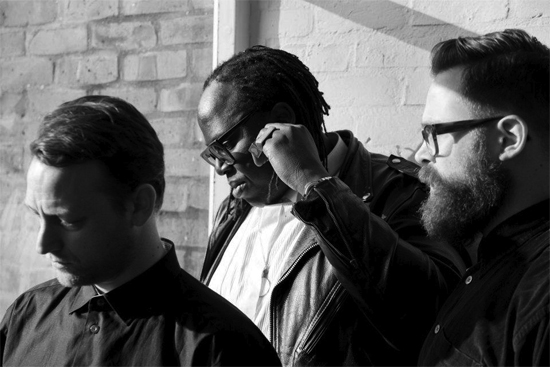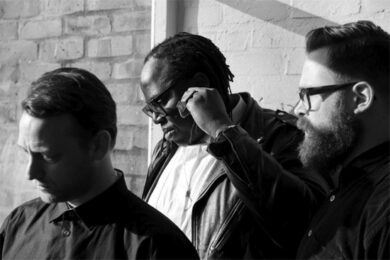On May 17th, Dave Okumu – singer and guitarist with The Invisible – was severely electrocuted while on stage in Nigeria. Now back home in London, Okumu is resting up after the electric shock left him with a right leg broken in two places. A few days ago The Quietus chatted to him and fellow bandmate Tom Herbert via a Skype video hook-up. We have never been as glad to be able to conduct an interview, and the interaction was buoyed by a tangible sense of joy and relief.
The Invisible actually have a new album to promote. Rispah is the follow-up to their 2009 self-titled debut, a gorgeous suite of electronic rock that earned a Mercury Prize nomination. The new record was deeply affected by the recent death of Dave’s mother – the album is named after her and contains samples of traditional Kenyan spirituals which Okumu heard during her funeral. Consequently, Rispah is highly emotive and graced with a deep spiritual clarity. It’s a magnificent record, born out of grief but bathed in a celebratory wonder.
As they sit smiling and sharing a beer, even across the video link there is a perceptible kinship between Okumu and Herbert (drummer Leo Taylor completes the trio) – men whose lives have been changed, irrevocably, forever.
It’s so lovely to be talking to you. What happened in Nigeria?
Dave Okumu: We were performing at an event in Lagos as part of this collaboration we’d been doing with some musicians out there, including one of our heroes, King Sunny Adé. We were getting ready to play a particular piece of music for which Tom and I were to change instruments – he would play my guitar and I would have his bass. We were in the process of swapping when I had contact with both instruments and completed the circuit and was electrocuted. It lasted about ten seconds but it felt like an eternity.
Tom Herbert: I wasn’t sure how long it was, but it was unreal. It didn’t sink in immediately. I couldn’t figure out why Dave wouldn’t drop the bass, but it was stuck to his hand because of the electric current. I think I managed to get the bass away. It was all a bit hazy.
Dave, were you conscious throughout the electrocution?
DO: Yes, I didn’t lose consciousness at any point, so I remember the whole thing clearly. I realised what was happening to me and I wanted to communicate to Tom who was looking absolutely horrified. I wanted to say ‘get the guitar off me’ as I couldn’t let go. I tried to say the words but all I could do was scream because I was in agony. It was really scary and I remember thinking ‘This is what the electric chair must feel like’. I pretty much thought I was going to die, and all the clichés of my life flashed before my eyes, like seeing loved ones. The next thing I remember was this surge of energy in my right leg and excruciating pain in my ankle, and then I was on the floor and it had stopped.
That sounds utterly horrific. Can you remember how you felt immediately afterwards?
DO: There was a mixture of very intense emotions going on. I was experiencing a huge feeling of relief at the fact that it had stopped and I was alive. On one level I almost felt victorious, but my leg was in so much pain and also I felt very, very angry that it had happened. There was a doctor in the audience and I was eventually moved off the stage. I was taken to hospital where I had various tests to see if my heart was still functioning properly and they X-rayed my leg and found the breaks. I spent the night in hospital in Lagos and we flew back home the next day.
How are you now?
DO: It’s extraordinary that everything seems okay, apart from my leg which is broken in two places. My heart is fine, and it feels like a miracle to be honest. I have got off very lightly given what actually happened.
It’s a dreadful thing to have happened and I’m so glad you are doing so well. Is it too early to have any sense of how the accident may affect you as a band?
DO: These last few days have been really, really significant for us. This was a deeply traumatic experience for all of us. We were in a country that was not known to us and there was so much to deal with. Seeing how we came together and how our bond has been completely affirmed in a really powerful way has been amazing. It’s been incredibly moving for me to be so unconditionally loved and supported through this, and to experience that means that the horror of the actual event pales into insignificance. It’s really heartening and empowering and makes you kind of feel invincible in a way. There’s a Martin Luther King quote about compelling humanity to remember that suffering has the potential to be redemptive. It does feel like that.
Shall we talk about music? I’m so sorry to hear about your mum. I know you had started working on Rispah before she died. What were your initial thoughts on how you wanted your second album to sound?
DO: There was a real desire to represent ourselves as a band, as we had a clearer sense of our identity than when we made the first record. There were things that we spoke about aesthetically and I distinctly remember us saying we wanted to make something emotional and beautiful. When my mum died we were quite deep into the process of making the record. We only had about three or four weeks of work to do and then this huge event happened which changed everything.
In what way?
DO: As soon as I got the news I became my own CCTV – I was just observing myself. I knew I had to just let all these things happen to me. One of them was that I lost the compulsion to listen to music. It didn’t make sense anymore.
What happened to get you out of that state?
DO: I went away to lay my mum to rest in Kenya. My mum’s funeral was an epic event – it lasted for five days in total. We had hundreds of people coming through our home every day. My grandmother arrived with some other women. They came into the house and were singing traditional spirituals over my mum’s body. The first time I heard it I had been sitting with my dad – the tradition is that the spouse sits with the body for three days and people come and pay their respects. I was sat outside with him in the evening and I heard the sound of the singing and the feeling returned. It was really powerful and went right to my core. It was a hugely spiritual and profound moment.
And that singing is featured throughout Rispah?
DO: Yes. It still shocks me that I had the wherewithal to capture those recordings, because I’m not usually that way inclined. Everything I believe music is for was so powerfully represented and there was a tangible sense of it transforming the atmosphere. There were so many people there going through different versions of grief and suddenly it was unified, but in a way that allowed people to express themselves. People were singing along and there was dancing. It’s like the heavens opened up and I was being shown the power of music.
When you came back, did the recording process start from scratch with entirely new songs?
DO: No. Before I went to Kenya I remember telling Leo and Tom to get on with the record because I trusted them. What was amazing for me was being out there in Kenya with her and then to return to this process that had started and find that it completely resonated with how I was feeling. Tom, Leo and Rich had made some choices about the tone and had whittled it down to nine key tracks. The decisions they had made created a structure for me to be able to express myself. I cannot begin to convey how comforting that was – to know you are that understood and can trust people.
Tom, making those artistic decisions must have been incredibly hard under the circumstances?
TH: We didn’t know what to do other than follow or instincts. Dave had lost the most important person in his life and because of our friendship it was going to affect our lives as well, just by virtue of the closeness. It became obvious quite quickly which stuff wasn’t going to fit the mood. There was a shift and it was clear which songs were part of that.
The album is an incredibly personal set of songs. Was it a difficult decision to make them public?
DO: There was something very scary about making this record. I wasn’t always clear what it was for but I felt this huge compulsion to grieve and be honest about that. I had moments of questioning whether that was indulgent but I knew I had to do it. For me, to have gone through a process and at the end feel good enough about it to name the record after my mum is the strongest statement about how I feel about the album. There is no way I could even consider doing that if I didn’t believe every single moment. When I was recording the vocals I had my mum’s picture in front of me and I knew if I could sing those words to her, what else could possibly matter? There is nothing left to prove.
Apart from convalescence, what are your plans for the rest of 2012?
DO: We’ll have to take it as it comes. We are looking forward to touring when it happens because we have been changed for the better by what we have been through. But, the most important thing at the moment is healing up and that is going really well. So, I’m sure we will be touring later on in the year.
Are they going to be unplugged, acoustic, low-voltage affairs?
DO: [Laughs]. Yeah. Exactly, we are going to tour tiny chapels or just go busking – with not a generator in sight. The health and safety is going to go to a whole new level.
Rispah is out via Ninja Tune on June 11th.



